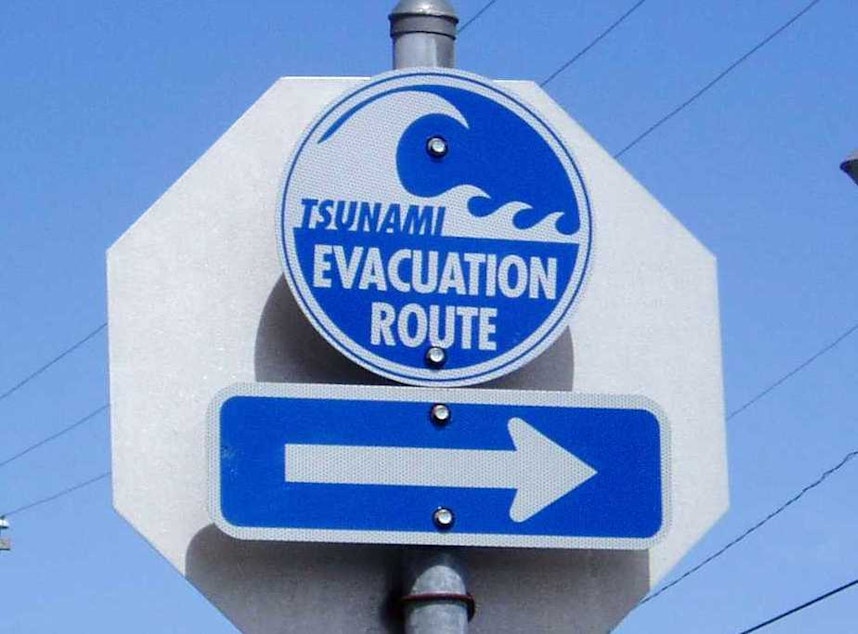Oregon policymakers may shake up development rules in tsunami zones

Sooner or later the offshore Cascadia fault zone is going to unleash a monster earthquake and tsunami. When that day comes, you hope that coastal schools, fire stations and hospitals are located high enough so that they don't get washed away just when you really need them.
In Oregon, it's state law that new schools and public safety buildings be built outside the tsunami zone. But that rule has a bullseye on it.
Unlike Washington and California, the Oregon Legislature made it a rule in the mid-1990s that certain “essential facilities” cannot be built inside the tsunami inundation zone — namely new hospitals, fire and police stations, schools, colleges and jails.
The current set of legislators from the Oregon coast now wants to junk that rule. State Rep. David Gomberg (D-Lincoln City) voiced concern about a chilling effect on the coastal economy.
"Who wants to build a new house in a neighborhood that is too dangerous for a fire department?" he asked. "Who wants to start a new business in a neighborhood that's not safe enough for a fire department or police department?"
Sponsored
Gomberg told a legislative panel he's seeing "a subtle disinvestment" from the coast.
"Our concern in summary is that as we prepare for a major natural disaster, we don't at the same time create an economic disaster," Gomberg said.
But disaster preparedness advisors are raising alarms about a wholesale lifting of the moratorium on building new critical facilities in the tsunami zone. The Oregon law in question doesn't restrict private development or home construction.
"I'm very concerned we could arrive at a situation where we have very weak regulatory control over what is being built in the tsunami inundation zone," said Jay Raskin, the outgoing chair of Oregon's seismic safety advisory panel.
Raskin says it's true that there is a scarcity of buildable land on the hillsides behind many Oregon coast towns. He said a good way to untangle what he calls this "Gordian knot" would be for the state to adopt the latest international building code.
Sponsored
California and Washington state have recently adopted the latest international building code with an effective date of 2020. The code revisions allow for new public buildings on the coastline if a higher construction standard is met, generally involving stronger foundations and robust steel-reinforced concrete.
"That would be a win-win for everyone involved," Raskin said in an interview. "We maintain safety for coastal residents and visitors. We get some sort of control over how buildings are built in the tsunami inundation zone."
Gomberg said lawmakers would need to learn more about the new code before possibly taking that route.
Coastal legislators long ago organized themselves into the bipartisan Coastal Caucus, comprising the eight Republican and Democratic legislators from districts along the Oregon Coast. In principle, they favor more local control, less state control. They have said they're fine with the state having a consultative role.
State Rep. Caddy McKeown (D-Coos Bay) insisted the lawmakers are not naïve about the tsunami hazard, nor is it their intention to put lives at risk.
Sponsored
"I don't want you to think we are downplaying or not understanding that," she said. "It's just something that we understand and live with because it's part of the risk we accept as coastal residents."
"We need to invest wisely," McKeown added in testimony to a joint House-Senate panel. "We need to do it appropriately. We need to make sure our citizens are prepared, but this is a risk we accept because we choose to live there."
The plan of the Coastal Caucus for now is to proceed with lifting the development restriction on essential services in the tsunami zone. The legislation to do so has passed out of the state House Natural Resources Committee, but needs further committee approvals and votes from the full House and Senate.
Meanwhile, whether there's a law to make them do it or not, a number of Oregon and Washington school districts and cities are moving critical buildings to higher ground or working on development code enhancements to consider tsunami risk when evaluating building proposals.
The Seaside School District is currently constructing a new campus outside the tsunami zone for all of its north Oregon coast students. Nearby, the Gearhart City Council is pushing to move the city's fire station to higher ground. The same is happening with the low-lying Quileute tribal school in LaPush on the Washington coast.
Sponsored
Moving schools out of the tsunami zone will save lives, said Oregon's State Resilience Officer Mike Harryman at a seismic safety commission meeting in Salem on Tuesday.
The 1995 tsunami safety law that the Oregon Legislature is considering repealing gave the authority over new construction in the tsunami zone to the state Department of Geology and Mineral Industries, often referred to by its acronym DOGAMI.
In a letter to the legislature, that agency said it has not denied a single project in the past 24 years the law has been in place. The current law includes a process to apply for an exception if it is impractical or impossible to relocate outside the tsunami zone.
Public radio contacted three state representatives from the coast to ask if there were building projects that they feared might be blocked. Reps. McKeown, Gomberg and David Brock Smith did not identify any specific projects hanging in the balance.
All three have spoken to a broader concern that DOGAMI, a science and data agency, is not well suited to do land use regulation.
Sponsored
Earlier this year, the agency board asked Oregon Gov. Kate Brown to appoint a task force to recommend the right balance between public safety and present-day community needs for an update to tsunami zone land use regulation.
The task force, which was created shortly before the coastal legislators introduced their bill, is proceeding on a separate track from the legislature. [Copyright 2019 Northwest News Network]

